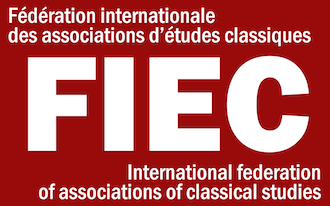Wednesday 20 October 2021
SIBC Conference: 100th Anniversary of l'Année Philologique
Conference Coming Up!
The SIBC organizes a conference for the 100th anniversary of the Année Philologique on November 5 - 6! Check out the flyer here!
Friday 25 June 2021
CfP: Sixth International Conference on the Ancient Novel
The Sixth International Conference on the Ancient Novel (ICAN VI), with the theme ‘Roads less travelled’, will take place from 21st to 24th September 2022 and will be hosted in hybrid form, both in Ghent (Belgium) and online. Proposals are hereby invited for papers and panels. The conference is open to all areas of study related to the ancient novel.
Further information and submission guidelines can be found at https://www.novelsaints.ugent.
Further information and submission guidelines can be found at https://www.novelsaints.ugent.
Wednesday 26 May 2021
Lisbon Declaration on Humanities, Open Research and Innovation
Thursday 22 April 2021
Thursday 15 April 2021
Studia Graeca et Latina Lundensia: Call for contributions
Call for Contributions
Reading, Writing, Translating. Greek in Early Modern Schools,
Universities and beyond
to be published in
Studia Graeca et Latina Lundensia
In this volume of Studia Graeca et Latina Lundensia, we want to bring together studies that investigate the practicalities of teaching and learning Greek in Early Modern northern Europe (c. 1500–1750). Accounts of the spread of Greek studies throughout Europe after its ‘arrival’ to Italy have often focused on its establishment in the curricula of schools and universities, on text transmission and editorial work, and the feats of early scholars of distinction. Recent years have witnessed a growing interest in questions of teaching and learning Greek, on teachers, students and schools, as well as teaching tools, methods, outputs and uses of Greek not only in Italy but also in central and northern Europe. This is a vast field of study that scholars have only begun to explore.
Specifically, we invite contributions dealing with the themes reading, writing, and translating (from/into) Greek in an Early Modern teaching and learning setting north of the Alps. Our aim is to further the understanding not only of the contexts and impact of Greek studies, but also of the reasons for and uses of engaging with the many varieties of Greek in a local and broader milieu. The focus of the edited volume and the question around which it will centre is how the Greek language and the transmitted Greek texts were used in educational contexts. Questions include, but are not limited to:
How were Greek texts used and adapted for educational purposes in manuscript, editions, anthologies, paraphrases, translations, commentaries etc. of school texts?
How was the Greek language used by students and teachers in various educational stages and for various purposes related to education?
What was translated (to and from Greek), how was it translated and for what educational usage, if any?
Studia Graeca et Latina Lundensia is a series published at Lund University, Centre for Languages and Literature, Greek and Latin sections. Authors retain the copyright of their work. The volume will be published under open access gold rules and under CC BY-SA licence. The volume is edited within the framework of the projects Helleno-Nordica and Classics Refashioned (Swedish Research Council, 2016-01881 and 2016-01884) at Lund University.
Those interested in contributing to this volume are asked to send a 300-word abstract for a 10 to 20 page contribution to the editors Johanna Akujärvi (Johanna.Akujarvi@klass.lu.se) and Kristiina Savin (Kristiina.Savin@kultur.lu.se). The language of the volume will be English.
Tentative timetable: Deadline for submitting abstracts May 31, 2021. Notification of acceptance June 7, 2021. Deadline for submitting the article December 17, 2021. Peer review and revision during spring and summer 2022. Publication in autumn 2022.
Wednesday 31 March 2021
Subscribe to:
Posts (Atom)
